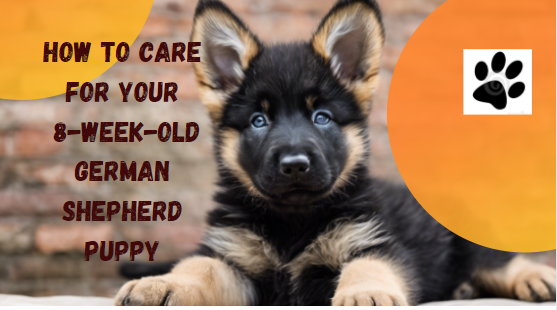Bringing an 8-week-old German Shepherd puppy into your home marks the beginning of a rewarding yet challenging journey. These lively and intelligent puppies quickly become integral family members, providing not only companionship but also a unique opportunity for owners to shape their development from a very young age. At 8 weeks old, German Shepherd puppies are at a crucial stage of their growth and learning, making this the perfect time to establish a foundation for a healthy, social, and well-behaved dog. The significance of proper care during these early weeks cannot be overstated, as it sets the tone for the puppy’s behavior, health, and overall well-being throughout their life.
Table of Contents
How to Care for Your 8 Week Old German Shepherd Puppy
This article will explore essential aspects of caring for 8-week-old German Shepherd puppies, covering their physical development and size, proper diet and nutrition, the importance of early training and socialization, health and vaccination schedules, understanding their sleep patterns and habits, and the need for appropriate exercise and play. Additionally, insights into their behavior and temperament will guide new owners in creating a nurturing environment, while grooming and care tips will ensure these puppies grow into majestic and healthy adult shepherds. With the right approach, raising a 8 week old German Shepherd can be a fulfilling experience, fostering a deep, lifelong bond between the dog and its family.
Physical Development and Size
Growth Milestones
German Shepherd puppies experience a significant amount of growth in their first few months. Initially, they can double their birth weight in just the first week. By the age of three months, a male German Shepherd puppy can weigh between 20-30 pounds, while a female may weigh slightly less, ranging from 15-20 pounds. This rapid growth continues until they are about five months old, at which point the rate of growth begins to slow down.
However, German Shepherds are not considered fully grown until they are about 18 months old. Females typically reach their full size around two years of age, while males may continue to grow until they are two and a half years old. This extended growth period is necessary for them to fill out their chest and abdomen fully, achieving their adult size and stature.
Expected Weight and Height
The size of a German Shepherd can vary significantly depending on gender and genetic factors. On average, a six-month-old male German Shepherd will weigh around 53 pounds, whereas a female will weigh approximately 46 pounds. As adults, males typically stand 24 to 26 inches tall and weigh between 75 to 90 pounds. Females are slightly smaller, standing 22 to 24 inches tall and weighing between 55 to 70 pounds.
It’s important to note that these dogs can continue to grow until they are around three years old, with the majority of their growth occurring within the first 24 months. If a German Shepherd continues to put on weight past 36 months, it’s advisable to consult a veterinarian to ensure the weight gain does not lead to obesity. The American Kennel Club outlines the breed standard for German Shepherds, indicating that males should weigh between 65-90 pounds and females should weigh 50-70 pounds once fully grown. However, due to various breeding lines and individual differences, some German Shepherds may exceed these weights.
Owners must monitor their German Shepherd’s growth closely, using tools like weight charts that consider the breed, lineage, and sex of the dog. These charts can help ensure that puppies grow within the expected weight range, maintaining their health and well-being. Understanding these growth milestones and expected weight and height ranges allows owners to provide the best care for their German Shepherd puppies as they develop into strong, healthy adult dogs
Diet and Nutrition

Recommended Diet
A well-balanced diet is crucial for the health and development of 8-week-old German Shepherd puppies. High-quality puppy food, specifically formulated for large-breed puppies, should be chosen to ensure they receive the proper nutrition for their growth. These foods should meet the AAFCO guidelines for growth to guarantee they contain the necessary nutrients. It’s essential to choose a diet that caters to the puppy’s life stage, size, and activity level, with a focus on foods high in proteins and fats for developing tissues and supporting brain, skin, and eye function. Vegetables and fruits also play a significant role in the diet, providing vital vitamins for healthy development.
Feeding Schedule
At 8 weeks old, German Shepherd puppies typically require feeding 3-4 times a day. This frequent feeding schedule helps provide a steady supply of nutrients throughout the day, supporting their rapid growth and high energy levels. The exact amount of food will vary based on the puppy’s size, activity level, and metabolism. A general guideline is to feed about 1/2 to 1 cup of puppy food per day, divided into these meals. Monitoring the puppy’s weight and body condition regularly is important to ensure they are growing at a healthy rate without becoming overweight.
Supplements
While a high-quality diet is fundamental, certain supplements can enhance a German Shepherd puppy’s health and development. Essential supplements include Omega-3 fatty acids for cognitive development and brain health, probiotics for digestive and immune system support, and specific nutrients for bone growth and gastrointestinal health. However, care must be taken not to provide excessive amounts of nutrients, which can be harmful. Consulting with a veterinarian is crucial to determine the necessity and appropriate dosage of supplements for individual puppies. Popular and generally safe supplements for most dogs include colostrum for immune support, digestive enzymes, fish oil, coconut oil, glucosamine, chondroitin, green-lipped mussel for joint health, and antioxidants for overall well-being.
| Supplement | Benefits |
| Omega-3 Fatty Acids | Supports brain and eye development, heart health, and skin and coat condition |
| Probiotics | Enhances digestion, mental health, and immune system |
| Colostrum | Boosts the immune system and protects against bacteria and viruses |
| Digestive Enzymes | Improves gut health and aids in nutrient absorption |
| Fish Oil (EPA and DHA) | Benefits cognitive health, eye health, and reduces inflammation |
| Coconut Oil | Provides MCTs for energy metabolism and can be used as a topical moisturizer |
| Glucosamine and Chondroitin | Protects and improves joint health |
| Green Lipped Mussel | Relieves pain and reduces inflammation in joints |
| Antioxidants | Supports overall health by protecting against various diseases and improving immune function |
It’s important to remember that while most puppies don’t need supplements if they are on a complete and balanced diet, specific health or behavioral issues may warrant their use. Always discuss with a vet to ensure the chosen supplements are beneficial and safe for your German Shepherd puppy.
Training and Socialization
Basic Commands
German Shepherd puppies are ready to start learning basic obedience commands as early as 6-7 weeks old. Simple commands such as “sit,” “down,” “stay,” “heel,” and “come” are crucial for establishing good behavior early on. Consistency and simplicity in commands help the puppy understand and respond effectively. For instance, the “down” command is essential, especially for a breed that may exhibit exuberant behavior, such as jumping on guests. Training should also include teaching the puppy not to engage in undesirable behaviors like play biting by redirecting their attention to appropriate activities.

Socialization Tips
The socialization phase is critical for German Shepherd puppies, ideally beginning by 10-14 weeks of age. This period involves exposing the puppy to various environments, sounds, people, and other animals to foster confidence and prevent fear or aggression. Activities can include short, engaging games that not only entertain but also build self-confidence. Regular grooming and exposure to grooming tools should be part of the socialization process to ensure the puppy is comfortable with handling. Additionally, crate training is recommended to aid in-house training and provide a safe space for the puppy.
Potty Training
Potty training a German Shepherd puppy requires consistency and patience. Establishing a routine is crucial, with recommended potty breaks at least every two hours for an 8-week-old puppy, adjusting as the puppy grows older. Crate training can be an effective strategy, as it utilizes the puppy’s natural instinct to avoid soiling their sleeping area. It is also important to use positive reinforcement, rewarding the puppy with treats and praise when they eliminate outdoors. If accidents occur, it is vital to maintain a positive approach and avoid punishment, focusing instead on reinforcing good behaviors.
Health and Vaccination
Vet Visits
The initial vet visit is a pivotal moment for an 8-week-old German Shepherd puppy, regardless of whether they come from champion show lines or a local shelter. This visit is particularly vital for puppies from rescues or shelters due to their exposure to unknown backgrounds and potentially contagious diseases. Establishing a Veterinary-Client-Patient Relationship (VCPR) is recommended by the American Veterinary Medical Association (AVMA) for ongoing health management. This relationship is crucial for the vet to diagnose and treat any medical conditions that may develop. During the first visit, the vet will conduct a comprehensive examination, including weighing the puppy, listening to their heart and lungs, and checking for the presence of worms, which are common in puppies.
Common Health Concerns
German Shepherds are susceptible to several health issues, many of which are congenital due to years of in-breeding. Joint problems, including hip and elbow dysplasia, are among the most prevalent health concerns. Degenerative myelopathy, a condition affecting the spinal cord leading to hind limb weakness, and various types of cancer, such as hemangiosarcoma and osteosarcoma, are also significant health risks for German Shepherds. Other common issues include allergies, particularly to flea bites and food sensitivities, and Exocrine Pancreatic Insufficiency (EPI), which leads to severe malnutrition. Regular veterinary check-ups and obtaining a puppy from a reputable breeder who conducts health screenings can help mitigate these risks.
Vaccination Schedule
Vaccinations are crucial for protecting puppies from dangerous and potentially deadly diseases. The typical vaccination schedule for puppies begins at 6 to 8 weeks of age, with appointments every 3 to 4 weeks until they are 4 or 5 months old. This schedule may be adjusted based on the puppy’s specific history and needs. Vaccines for diseases such as Bordetella bronchiseptica, Canine Distemper, and Canine Parvovirus are essential. Additionally, starting heartworm preventive medication around 12 to 16 weeks is recommended, as there is no vaccine for heartworm in dogs.
The vaccination protocol may vary based on factors like geographic location and the dog’s individual risk factors, and not all dogs need every vaccine. The decision on which vaccines are necessary should be made in consultation with a veterinarian. The core vaccines typically include DHLPP (distemper, hepatitis, leptospirosis, parvo, and parainfluenza) and rabies, with the average cost ranging from $75 to $100 for the series. It’s important to discuss with the vet whether yearly vaccinations are necessary for adult dogs, as opinions vary. Some owners opt for titer tests to measure a dog’s immunity levels before administering annual vaccinations, though rabies vaccinations are required by law across the United States.
Sleep Patterns and Habits
Sleep Duration
German Shepherd puppies, like all growing canines, require a substantial amount of sleep to support their rapid physical and cognitive development. At 8 weeks old, a German Shepherd puppy typically needs about 18 to 20 hours of sleep per day. This extensive sleep requirement gradually decreases as the puppy ages. By the time they reach 10 weeks, the daily sleep requirement adjusts to approximately 18 hours. As puppies grow into their third month, their sleep duration aligns closer to 16 hours, reflecting a pattern more akin to adult dogs, with increased periods of wakefulness and activity.
Best Practices for Sleep
To foster healthy sleep habits in German Shepherd puppies, it is crucial to establish a consistent sleep schedule and create a conducive sleeping environment. This includes setting a regular bedtime and ensuring the sleeping area is quiet, dark, and comfortable. Introducing a bedtime routine can also significantly benefit the puppy’s ability to sleep through the night. This routine might involve a short walk or a calm play session before bed, which helps in expending any leftover energy and signals to the puppy that it’s time to wind down.
Providing a comfortable bed, ideally located in a crate or a designated puppy-safe area of the home, is essential. The bed should be equipped with soft, washable bedding to accommodate the puppy’s need for a snug and secure feeling while sleeping. Additionally, keeping the sleep environment at a suitable temperature and free from noise and disturbances can further enhance the puppy’s sleep quality.
For puppies that struggle with sleeping through the night, implementing a small, nutritious snack before bedtime can help prevent hunger from waking them prematurely. Moreover, ensuring the puppy has had sufficient opportunity to relieve themselves right before bed minimizes the chance of nighttime disturbances.
By adhering to these practices, owners can help their German Shepherd puppies develop into well-rested and healthy adult dogs, ready to face the challenges and activities of the next day.
Exercise and Play
Exercise Needs
German Shepherd puppies require structured exercise to support their rapid physical and mental development. It is recommended that they engage in physical activities twice a day, with each session lasting approximately five minutes per month of age. For example, an 8-week-old puppy would need about 10 minutes of exercise per session. This routine helps in managing their high energy levels and prevents behavioral issues such as excessive barking or chewing.
Incorporating a variety of activities such as structured play, walks, and short training sessions is essential for balanced development. Activities should be designed to stimulate both their bodies and minds, ensuring they grow into well-rounded adults.
Safe Play Activities
- Fetch and Variations: Engaging in fetch not only satisfies the puppy’s instinct to chase and retrieve but also helps in cognitive development. Introducing variations in the game keeps it interesting and mentally challenging for the puppy.
- Tug-of-War: This activity taps into the German Shepherd’s natural desire for physical challenges and playful dominance. It’s a fun way to expend energy and strengthen the bond between the puppy and the owner.
- Obedience Training: Integrating obedience training into playtime provides mental stimulation and helps in building communication and trust. Commands like ‘sit’, ‘stay’, and ‘come’ turn into a fun game that teaches discipline.
- Puppy Agility: Setting up a simple agility course at home can be a thrilling experience for a puppy, requiring them to navigate through tunnels or jump over hurdles. This activity enhances their physical agility, concentration, and confidence.
- Hide and Seek: This classic game is excellent for mental stimulation. It encourages the puppy to use their natural scent-tracking abilities, enhancing their problem-solving skills and spatial awareness.
- Puzzle Toys: These toys are perfect for times when physical play isn’t possible. They challenge the puppy’s mind by requiring them to solve puzzles to receive rewards, keeping them engaged and mentally active.
- Scent Games: Engaging the puppy in scent games where they have to find a hidden object can be as mentally stimulating as it is fun. This activity enhances their olfactory skills and cognitive abilities.
- Socialization Walks: Regular walks that expose the puppy to various environments, sounds, and beings are crucial. These walks are not just physical exercises but also socialization opportunities that help reduce anxiety and build confidence.
- DIY Obstacle Course: Creating a custom obstacle course for your puppy can provide a unique blend of physical and mental challenges tailored to their specific needs and abilities. This can include a mix of agility tasks and problem-solving situations.
- Interactive Play: Direct playtime with the owner, like running and jumping, teaches the puppy important social cues and life skills such as impulse control and bite inhibition.
By incorporating these activities into a German Shepherd puppy’s routine, owners can ensure their pets receive the necessary exercise that is safe yet sufficiently stimulating to foster their growth and development.
Behavior and Temperament
Typical Behaviors

German Shepherds are known for their intelligence and often exhibit a strong desire to learn and excel in various tasks. They are inherently protective, which can manifest as alertness and sometimes suspicion of strangers, making them excellent guard dogs. This breed is not naturally aggressive; however, they can display aggression if they are mistreated, improperly trained, or lack socialization. It’s vital to understand that while German Shepherds can be tough and don’t easily back down, they are also capable of being incredibly gentle and loving family pets with the right training and care.
Tips for Managing Behavioral Issues
- Early Training: Begin training as soon as your German Shepherd comes home. Consistent, positive reinforcement helps establish good behavior patterns early on.
- Socialization: Expose your puppy to a variety of environments, people, and other animals. Socialization helps prevent fearfulness and aggression, fostering a confident and calm adult dog.
- Routine and Exercise: Establish a consistent daily routine including plenty of physical activity. German Shepherds require regular exercise to manage their energy levels and prevent boredom, which can lead to destructive behaviors.
- Mental Stimulation: Engage their intellect with puzzle toys, training sessions, and interactive games to prevent boredom and promote mental health.
- Positive Reinforcement: Use treats, praise, and play to reward and reinforce good behavior. This approach is more effective and strengthens the bond between you and your dog.
- Professional Guidance: If behavioral issues persist despite your efforts, consider seeking help from a professional dog trainer or behaviorist who can provide tailored guidance and support.
By following these tips and understanding the typical behaviors of German Shepherds, you can foster a healthy, happy, and well-behaved dog.
Grooming and Care
Bathing
German Shepherds, known for their double coat that naturally repels dirt and water, do not require frequent baths. Bathing them too often can strip their coat of essential oils, leading to skin issues. It is recommended to bathe a German Shepherd puppy every 2 to 3 months or as necessary when they become particularly dirty or smelly. Using a gentle dog shampoo formulated for puppies is crucial to avoid irritation . When bathing, it’s important to ensure that no soap residue is left on the skin as it can cause irritation. Additionally, care should be taken to avoid water in their ears, which can be dried using a cotton ball or a piece of paper towel .
Brushing
Regular brushing is vital in managing shedding and maintaining the health of a German Shepherd’s coat. Brushing should be done at least three times a week, with the frequency increasing during the spring and fall when they experience heavy shedding. Start the brushing session by making the dog comfortable and relaxed, potentially using treats as rewards. Use tools like the Furminator to effectively remove loose hair from the undercoat. For areas with thicker hair such as the neck and hindquarters, a pin brush can be used to tackle knots and distribute natural oils throughout the coat.
Nail Trimming
Nail trimming is an essential aspect of grooming to prevent discomfort and health issues. The frequency of nail trimming depends on the dog’s activity level and the surfaces they walk on. Dogs that frequently walk on pavement may naturally wear down their nails, while others may require trimming every two to three weeks. It is crucial to avoid cutting the quick, which is sensitive and can bleed if trimmed too closely. Using the right tools, such as Millers Forge Nail Clippers for larger dogs, and introducing puppies to nail trimming early in life can make the process smoother and less stressful for both the dog and the owner.
By adhering to these grooming practices, owners can ensure their German Shepherd puppies maintain a healthy, clean, and well-groomed appearance, contributing to their overall well-being.
Conclusion

Through the exploration of caring for an 8-week-old German Shepherd puppy, this article delved into the importance of nurturing these intelligent and lively beings with the right blend of love, discipline, nutrition, and exercise. The journey from understanding their developmental milestones and dietary needs to integrating effective training, socialization practices, and grooming rituals encompasses the foundational steps towards raising a well-balanced and healthy dog. Addressing health concerns promptly, ensuring a structured vaccination schedule, and recognizing the breed’s specific needs reaffirm the commitment required to foster their growth into majestic and dependable adult shepherds.
Ultimately, the relationship between a German Shepherd puppy and its owner is fortified through consistent care, empathetic understanding, and patient guidance during these formative weeks. Embracing the responsibilities that come with puppy ownership not only leads to the development of a disciplined and joyful companion but also enriches the lives of the owners themselves. As this journey unfolds, it becomes evident that raising a German Shepherd puppy is a rewarding endeavor that strengthens the bonds of companionship, laying the foundation for a lifetime of mutual respect, love, and loyalty.
FAQs
How often should you feed an 8-week-old German Shepherd puppy? An 8-week-old German Shepherd puppy should be fed multiple times throughout the day. It is recommended to feed them small, frequent meals.
2. At what age should you begin potty training a German Shepherd puppy? You should start potty training your German Shepherd puppy when they are between 8 to 12 weeks old. Initially, take them out to a designated spot every hour. As they grow older, you can gradually extend the time between outings. By the age of 3 months, a German Shepherd puppy should be able to hold their bladder for up to 4 hours.
German Shepherd Puppy care
3. What are the basics of caring for a German Shepherd for first-time owners? For newcomers to owning a German Shepherd, it is crucial to maintain a regular routine of care, diet, and exercise. Brush your German Shepherd thoroughly at least once a week for most of the year, and brush their teeth at least twice a week to maintain dental health. Since German Shepherds have a high prey drive, they should be walked on a leash and have access to a securely fenced yard.
4. Is it okay to leave a German Shepherd puppy alone for long periods? No, it is not advisable to leave a German Shepherd puppy alone for more than 8 hours a day. They can become bored and may engage in destructive behaviors such as digging, chewing, and barking if left alone for too long.
- German Shepherds Temperament: Are They Good With Kids?
- How to Care for Your 8 Week Old German Shepherd Puppy
- What is a German Shepherd dog? Full guide dogs about this dog breed 2024
- How Many Years Does a German Shepherd Live: Unveiling the Lifespan of a Beloved Canine Companion
- How to deshed a German Shepherd: Your step-by-step guide to taming the shedding beast in your German Shepherd




